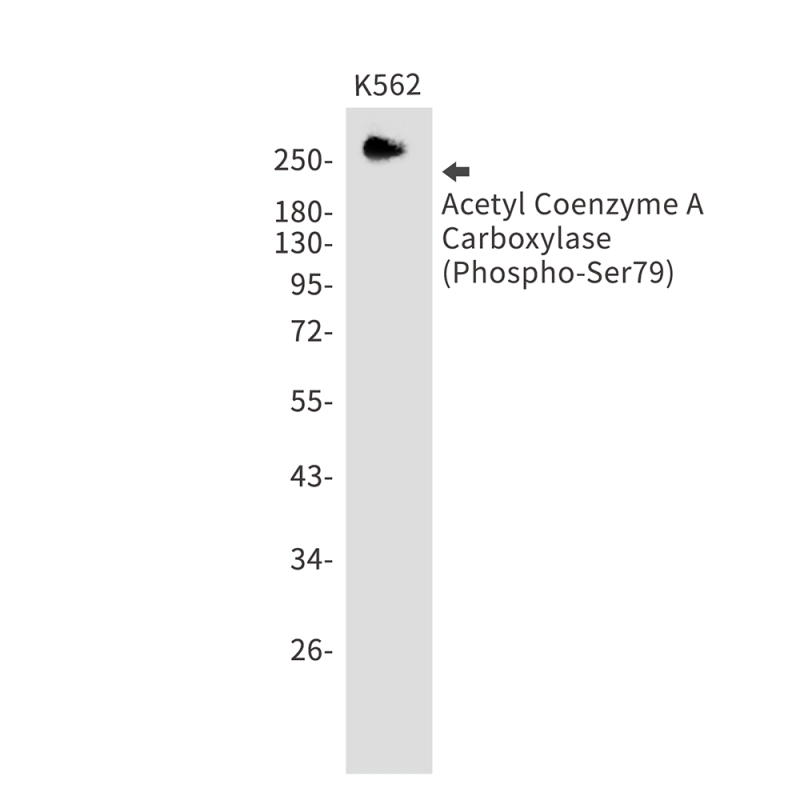
| WB | 咨询技术 | Human,Mouse,Rat |
| IF | 咨询技术 | Human,Mouse,Rat |
| IHC | 咨询技术 | Human,Mouse,Rat |
| ICC | 技术咨询 | Human,Mouse,Rat |
| FCM | 咨询技术 | Human,Mouse,Rat |
| Elisa | 咨询技术 | Human,Mouse,Rat |
| Aliases | ACACA; ACAC; ACC1; ACCA; Acetyl-CoA carboxylase 1; ACC1; ACC-alpha |
| Entrez GeneID | 31 |
| WB Predicted band size | Calculated MW: 266 kDa; Observed MW: 277 kDa |
| Host/Isotype | Rabbit IgG |
| Antibody Type | Primary antibody |
| Storage | Store at 4°C short term. Aliquot and store at -20°C long term. Avoid freeze/thaw cycles. |
| Species Reactivity | Human |
| Immunogen | A synthetic phosphopeptide corresponding to residues surrounding Ser79 of human Acetyl Coenzyme A Carboxylase |
| Formulation | Purified antibody in TBS with 0.05% sodium azide,0.05%BSA and 50% glycerol. |
+ +
1. **"AMP-activated protein kinase phosphorylates and inactivates acetyl-CoA carboxylase"**
- *Authors: Winder, W.W., Hardie, D.G.*
- **摘要**: 该研究首次揭示了AMPK通过磷酸化ACC Ser79位点抑制其活性,调控脂肪酸代谢,为能量应激下的代谢平衡提供机制解释。
2. **"Leptin stimulates fatty-acid oxidation by activating AMP-activated protein kinase"**
- *Authors: Minokoshi, Y., Kim, Y.B., et al.*
- **摘要**: 发现瘦素通过激活AMPK诱导ACC Ser79磷酸化,促进脂肪酸氧化,阐明了瘦素在能量代谢中的关键作用。
3. **"The subcellular localization of acetyl-CoA carboxylase 2"**
- *Authors: Abu-Elheiga, L., Brinkley, W.R., et al.*
- **摘要**: 利用Phospho-ACC (Ser79)抗体证实ACC2在线粒体的分布及其磷酸化状态,探讨其在肥胖模型中的代谢调控异常。
4. **"AMPK regulates metabolism and survival in response to energy stress in breast cancer cells"**
- *Authors: Carretero, J., Medina, P.P., et al.*
- **摘要**: 在乳腺癌细胞中,AMPK通过磷酸化ACC Ser79抑制脂质合成,揭示能量应激下肿瘤细胞代谢重编程的机制。
Phospho-Acetyl Coenzyme A Carboxylase (Ser79) antibodies are essential tools for studying the regulation of fatty acid metabolism. Acetyl-CoA carboxylase (ACC) is a rate-limiting enzyme that catalyzes the conversion of acetyl-CoA to malonyl-CoA, a key substrate for fatty acid synthesis and an inhibitor of fatty acid oxidation. ACC activity is tightly controlled by phosphorylation, particularly at Ser79 (Ser79 in ACCα, corresponding to Ser212 in ACCβ), a site targeted by AMP-activated protein kinase (AMPK). Phosphorylation at Ser79 inactivates ACC, reducing malonyl-CoA levels and promoting fatty acid oxidation while suppressing synthesis. This regulatory mechanism links cellular energy status (via AMPK) to metabolic adaptation under conditions such as fasting, exercise, or stress.
Phospho-specific antibodies against ACC Ser79 enable researchers to detect this post-translational modification, providing insights into AMPK signaling and metabolic dysregulation in diseases like obesity, diabetes, and cancer. They are widely used in Western blotting, immunofluorescence, and immunoprecipitation to assess ACC phosphorylation status in response to metabolic stimuli (e.g., insulin, metformin) or pathological conditions. These antibodies also serve as biomarkers for evaluating AMPK activator efficacy in drug development. Specificity validation via knockout/knockdown models or phosphatase treatment is critical, as cross-reactivity with other phospho-sites or ACC isoforms (ACC1/ACC2) may occur. Overall, these antibodies are pivotal for exploring cellular energy homeostasis and therapeutic strategies targeting metabolic disorders.
×